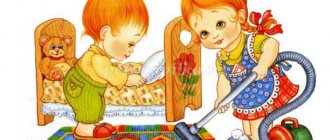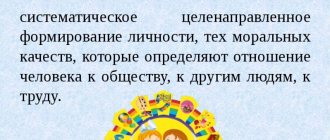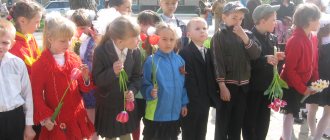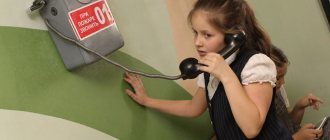MAGAZINE Preschooler.RF
Labor education of children of senior preschool age.MDOU "D/s No. 121 k.v." Magnitogorsk
- Biktimirova Aigul Rifovna Educator,
- Kulanina Elena Sergeevna senior teacher
- Prokhorova Marina Mikhailovna Head
“If a child has invested a piece of his soul into working for people and has found personal joy in this work, he can no longer become an evil, unkind person . V.A. Sukhomlinsky
The work of children in kindergarten is varied. This allows them to maintain their interest in activities and provide them with comprehensive education and upbringing.
There are four main types of child labor: self-care, domestic labor, outdoor labor and manual labor. The share of certain types of labor at different age stages is not the same. Each of them has certain capabilities for solving educational problems.
Self-care is aimed at caring for oneself (washing, undressing, dressing, making the bed, preparing the workplace, etc.). The educational significance of this type of work activity lies primarily in its vital necessity. Due to the daily repetition of actions, self-service skills are firmly acquired by children; self-care begins to be recognized as a responsibility.
In older preschool age, new self-care skills are acquired: making the bed, caring for hair and shoes. The processes associated with it are used to solve more complex educational problems: developing in children the habit of neatness and cleanliness, and behavioral skills when surrounded by peers. The child serves himself while being around others, and therefore he must understand the needs and difficulties of others. Using specific examples, explain how to act, taking into account the needs of others: step aside in the dressing room to allow passage to someone who has already undressed; when washing, let those on duty go ahead (it is more important for them to wash as quickly as possible in order to begin their duties), do not linger at the tap so that everyone washes on time, ask permission to pass so as not to cause inconvenience to anyone, etc. All this shapes children basic courtesy and respect for others.
Household work of preschoolers is necessary in the daily life of a kindergarten, although its results are not so noticeable in comparison with other types of their labor activity. This work is aimed at maintaining cleanliness and order in the premises and area, helping adults in organizing routine processes. Children learn to notice any disturbance of order in a group room or area and, on their own initiative, eliminate it. Household work is aimed at serving the team and therefore contains great opportunities for developing a caring attitude towards peers. It is imperative to evaluate the moral side of children’s labor participation: “Natasha and Seryozha helped our nanny well, what great guys!”, “Irochka is a caring girl, neat, how diligently she put away her toys!” Such assessments make children want to imitate their peers and contribute to the formation of ideas about how to act in such cases.
In the older groups of the kindergarten, household work is even more enriched in content and becomes systematic, largely turning into the permanent duties of those on duty. Children keep the room and area clean, repair toys and books, and provide assistance to children. The peculiarity of the household work of older preschoolers is the ability to organize it independently: select the necessary equipment, place it conveniently, put everything in order after work. In the process of work, children show diligence, a desire for a good result, and treat their peers kindly.
Labor in nature involves the participation of children in caring for plants and animals, growing plants in a corner of nature, in a vegetable garden, in a flower garden. This type of work is of particular importance for the development of observation, nurturing a caring attitude towards all living things, and love for one’s native nature. Helps solve problems of children's physical development, improving movements, increasing endurance, and developing the ability to perform physical effort.
In older groups, duty in a corner of nature is introduced. The duty officers change daily, each of the children systematically participates in all types of duty. As a rule, children are on duty together. When selecting duty officers, the growing friendships between children are taken into account and their desire to work with one of their peers is satisfied. If the skills of one of the attendants are more advanced, he is advised to be attentive to his comrade, to provide him with assistance, but not to deprive him of his independence, and not to express his dissatisfaction with his slowness or inability. Teaching children to coordinate their actions, determine what needs to be done taking into account the actions of a friend, agree on who will do what part of the work, teaches them self-control, time- and effort-saving work methods.
Manual labor - making objects from a variety of materials: cardboard, paper, wood, natural materials (cones, acorns, straw, bark, corn cobs, peach pits), waste material (reels, boxes) using fur, feathers, fabric scraps, etc. , p. - carried out in older groups of kindergarten. Children make the toys they need and attributes for games: boats, cars, baskets, houses, furniture, animals. Such crafts can be a pleasant gift for family and friends. This is of no small importance in moral education, teaching children to pay attention to others and to work hard in order to please them. Manual labor develops children's constructive abilities, creativity, imagination, and invention.
The work of preschool children in kindergarten is organized in three main forms: in the form of assignments, duties, and collective work activities.
Assignments are tasks that the teacher occasionally gives to one or more children, taking into account their age and individual characteristics, experience, as well as educational tasks. Instructions can be short-term or long-term, individual or general, simple (containing one simple specific action) or more complex, including a whole chain of sequential actions.
In the older group, individual assignments are organized in those types of work in which children have insufficiently developed skills, or when they are taught new skills. Individual instructions are also given to children who need additional training or particularly careful control, i.e., if necessary, individualize methods of influence.
Considering that self-organization skills in children of the older group are not yet sufficiently developed, great attention should be paid to explaining the ways of arranging equipment, placing inventory, and distributing work among its participants.
Duty duty is a form of organizing children’s work, which requires the child to perform work aimed at serving the team. Children are alternately included in different types of duty, which ensures the systematicity of their participation in work. The appointment and change of duty officers occurs daily. Duties have great educational value. They put the child under conditions of obligatory fulfillment of certain tasks; they are needed for the team. This allows children to develop responsibility towards the team, caring, and an understanding of the necessity of their work for everyone.
Duties are being introduced gradually. There is one person on duty at each table every day. It is necessary to teach the child to maintain consistency in work, to control him, to come to the rescue, and to take into account his individual characteristics.
When assessing the work of those on duty, emphasize their diligence, thoroughness in performing duties, care for their comrades, and assistance provided to adults.
Familiarizing children with the work of adults and cultivating interest and respect for their work are of great importance. All these tasks contribute to the formation of the components of work activity: the formation of motives and goals of work, the determination of the objects and nature of work, the correct selection of tools and materials, the formation of work activity, and the ability to evaluate its results.
Work in preschool age is of great importance for the mental development of children: in the process of becoming familiar with the purposes, properties and qualities of materials and tools, mastering actions with them, planning a sequence of operations, perceptions, ideas, various forms of thinking and mental operations develop. In the process of labor education, children’s ideas about the life and occupations of people, the benefits and results of their work are expanded and concretized.
Labor also serves as a means of physical education for children, since visual-motor coordination and fine motor skills are developed, movements, their coordination and consistency are improved. The formation of arbitrariness of movements in the process of labor actions is important. Achieving work goals and their results bring joy to children and evoke an emotional response.
All these tasks contribute to the formation of the components of work activity: the formation of motives and goals of work, the determination of the objects and nature of work, the correct selection of tools and materials, the formation of work activity, and the ability to evaluate its results.
Thus, it is necessary to note the variety of types of child labor in preschool educational institutions: self-service, household labor, labor in nature and manual labor. By implementing a broad program of labor education, developing knowledge about labor processes (goals, materials and tools, labor actions and results), the skills necessary for participation in labor and their focus (obtaining a socially useful product) - all this ensures the success of children’s independent work. Mastery of skills also has a direct impact on the formation of personal qualities, for example, independence. The child becomes able not only to wash himself, undress, wipe the dust, put toys back in place, but also to help other children. This allows him not only to establish himself in the team as a skillful and responsive comrade, but also to gain confidence in himself and his capabilities. Labor skills play an important role in developing in children the right attitude towards their own work: readiness to participate in any work, regardless of its attractiveness, to complete the task, and to make labor efforts. All this creates a favorable basis for the development of such qualities as responsibility, initiative, dedication, perseverance, and determination.
Bibliography:
- Bure R.S., Zagik L.V. et al. Education of preschool children at work. — 3rd ed., isp., additional. - M., 1983
- Ivashchenko F.I. Psychology of labor education. — Minsk, 1988
- Kaplan L.I. If you sow a habit, you reap a character. - M., 1980
- Nechaeva V.G. Raising a preschooler at work. - M., 1990
- Educational psychology / Ed. Klyuevoy N.V. - M., 2003
- Labor and observations in nature. - M., 1987
- Tsukerman G.A., Elizarov N.V. About children's independence //
- Questions of psychology. - M., 1990. - No. 6. – pp. 10-21
| Next > |
Artistic media
Artistic media include: painting, literature, music and almost all other areas of artistic art. These works evoke emotional interest, the desire to become like the one whose works have come to us through years, centuries; on the one who works, toil, help to understand the importance, show the full significance of hard work as the most important personality quality. The use of works of art becomes especially important in preschool educational institutions.
All artistic means are effective in the pedagogical process. Their role is unique. Just listening to music or looking at pictures does not teach you how to work. Only with the observance of certain principles do the means begin to really work and provide assistance in the formation of the most important working qualities.
Literature provides basic knowledge about the emergence of professions, the process of making everyday things, famous people who made a huge contribution to the historical development of mankind. Works of fiction provide a generalization of the role, benefits of labor, and mutual assistance of professions. Children develop positive images that they begin to strive for when creating themselves.
Works of fine art show the process of labor and have a certain emotional mood. Sometimes it is joy, an upsurge of emotions, in other cases it is a calm respite, enjoying the result of the work.
The work is not easy and not easy. Children must understand this in order to learn to form an attitude towards people working for the good of society with respect, compassion, and pride. To do this, the teacher can recommend that parents visit an art gallery, exhibition with the children, or look at reproductions of paintings at home, and talk about the meaningful meaning of the works.
Music also helps to create a desire to work. Musical recordings can be used positively in a group, on a site. They can lift your spirits and give your current routine a consistent rhythm. With music, work becomes more enjoyable and much easier. It is recommended to use it when carrying out collective cleaning of groups, classrooms, during basic manual labor, and when working on site.
?
All artistic means bring maximum effect in the pedagogical process when they are used systematically, in interaction with each other, and if they are organized.
Own activities
Independent work activity is considered the main means of education. In this way, children learn basic work skills, acquire the opportunity to achieve the expected result, and satisfy the need to join the adult world.
A child’s activity is an effective means of education. It is preceded by training in basic skills. The child independently masters meaningful activities. It includes participation in socially useful work and self-service. This tool helps the development of significant motives, forms of behavior, the formation of care for people, wildlife, and surrounding objects.
The child’s activity has an educational impact provided that it has an organized form, otherwise its meaning becomes neutral.
To implement the tasks of education, conditions are created that promote the development of basic qualities from an early age, forming a culture of personal education, attitude towards work, its result, and the working person.
The child’s independent activity is used at all stages of upbringing. During the long school period, the forms of independent activity are varied. Among them are:
- labor actions, assistance to veterans, other volunteer forms;
- activities aimed at improvement and repair;
- production practice.
Independent work of preschoolers has certain requirements. There are two types of it: individual, collective.
Individual forms are characterized by the fact that most of the work is done by the child individually , but always under the supervision of the teacher. This creates optimal conditions for understanding, awareness of the social orientation, the significance of the achieved result, for the high-quality development of effective actions, and then complex processes under the guidance of an adult educator.
The material will be supplemented by an article about the problems of labor education of children.
In individual work, attention is paid to constant monitoring of the correctness, accuracy of execution, quality of the result, accuracy, discipline during work, control over order, pace, efficiency.
In preschool age, the first opportunity for collective work appears with characteristic features: a significant goal, division of responsibilities, collective result, responsibility of participants in the labor process, children’s dependence on each other. In collective work, conditions arise for the manifestation of mutual assistance, demanding of each other, and mutual responsibility.
Problems of labor education in preschool educational institutions and schools
With the acquisition of initial skills and the ability to work together, the organization of a collective form becomes much more complicated.
Goals of labor education
?
Education through labor is an indispensable condition for the comprehensive, full development of the individual. On the one hand, physical labor stimulates mental activity, and on the other, the moral qualities of the individual.
In pedagogy, the main goal of labor education is the moral and psychological (practical) preparation of children for work. The goal is achieved gradually, taking into account the age, capabilities, and interest of the children. The global goal is a hardworking society, ready for change, capable of working for the benefit of their families and the common cause.
Labor education at school - the main tasks and their solution
Labor education begins in the family - we have talked about this more than once. But school also has a significant influence on the upbringing of a young person. For schoolchildren, work is a necessary and important means of developing moral ideas and personality traits. The goal of labor education of schoolchildren is the formation of a natural physiological and intellectual need for work. At school, it is closely connected with the polytechnic training of students, which ensures a level of knowledge of the basics of technology and organization of production.
Within the walls of a comprehensive school, labor education solves several basic and important tasks:
- Motivation to work, stimulation of interest in knowledge, the need for work as a creative process, the desire for practical activity;
- Formation of a positive attitude towards work among schoolchildren;
- Education of moral qualities: a sense of duty, hard work, responsibility, mutual assistance, determination, perseverance, honesty;
- Development of students' creative abilities through manual labor;
- Schoolchildren mastering various types of techniques, labor skills, forming an internal culture of physical and mental work.
Tasks of labor education of preschool children
Labor education of preschool children begins in the family and is of great importance for the development of a little person. Preschool age is a period of imitation. Children copy everything they see. They like to work. This unique moment cannot be missed. It is necessary to encourage initiative, stimulate interest, and develop the work skills of children.
According to the Federal State Educational Standard, the term “labor education” is a system for developing in children diligence, labor skills and the desire to learn to work.
Teachers see the goal of labor education in kindergarten as the formation of the same positive attitude towards work and moral qualities. Instilling respect for the work of adults is one of its main goals.
In the work activities of preschoolers, an important role is assigned to the teacher. The teacher’s task is to help the child acquire his own experience and skills in work that is feasible for his age. Involvement in work activity allows them to demonstrate their abilities, feel like a part of the adult world, and enjoy the joy of contemplating the result of their work. The teacher organizes work activities, unites the team, teaches children to work together, help adults, and each other.







